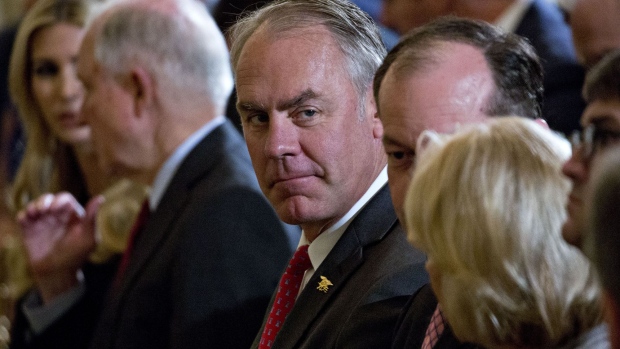Jul 23, 2019
Former Interior Chief Zinke Now Enlisting Energy, Mining Clients
, Bloomberg News

(Bloomberg) -- Former Interior Secretary Ryan Zinke is lining up consulting clients in industries regulated by his former department at the same time he decries the ethics investigations that drove him from the Trump administration.
In an interview with Bloomberg News, the former congressman and U.S. Navy SEAL dismissed the 15 ethics probes of his dealings atop the Interior Department as “BS.”
“D.C. is so angry and hateful,” Zinke said. Ultimately, he added, he stepped down from his cabinet post in January amid concerns about mounting legal bills and the fear that “all these false allegations would be a distraction.”
Zinke was a freshman representative from Montana in December 2016 when Donald Trump chose him to run the Interior Department, an $11 billion agency that oversees drilling, mining and other activities on public lands. Now, he’s going to work for oil and mining companies.
Among them: Texas pipeline supplier Cressman Tubular Products Corp. and Oasis Petroleum Inc., a Houston-based oil and gas explorer that donated tens of thousands of dollars to Zinke when he was seeking re-election to the House. In April, Zinke joined the board of U.S. Gold Corp., and is set to receive $90,000 in consulting fees from the Nevada-based mining company, according to filings.
He is also a managing director and consultant for North Carolina-based private investment company Artillery One, and is promoting U.S. liquefied natural gas to foreign markets. He is serving as an adviser to Turnberry Solutions, the Washington lobbying firm stacked with former Trump administration advisers and campaign aides.
Zinke said his work does not run afoul of prohibitions on post-government employment. Under federal law, a one-year cooling off period blocks administration officials from lobbying their former agencies in the 12 months after they depart. Under a separate executive order, employees serving in the Trump administration must wait five years before conducting lobbying activities, though there is no criminal penalty for violating that pledge.
Zinke said he is not lobbying but, rather, helping firms navigate state and federal permitting processes.
“I promote energy,” he said. “It is better to produce energy in this country with reasonable regulation then watch it get produced overseas with none.”
Nevertheless, Zinke’s business dealings illustrate the revolving door between government jobs and corporate interests, said Virginia Canter, chief ethics counsel for Citizens for Responsibility and Ethics in Washington.
Federal law restricting post-government lobbying doesn’t “bar you from doing behind the scenes consulting, it doesn’t bar you from working on legislative matters and it doesn’t bar you from sharing information on how to best implement your lobbying goals” with private sector clients, she said.
Top administration officials are supposed to be “above reproach,” Canter added, but “if they’re going out and engaging in obtaining employment from entities with interests before their former agencies, it really begs the question of whether, when they were making policy, were they doing it in the public interest or were they really doing it to enhance their post- employment opportunities?”
Zinke, who enraged environmentalists by, among other things, lifting an Obama administration moratorium on selling coal mining rights and scaling back protections on federal land, left the administration amid a swirl of federal investigations into his travel, potential conflicts of interest and his political activity -- including a picture he posted on Twitter showing socks with Trump’s “Make America Great Again” slogan.
Land Deal
One inquiry focused on a potential conflict of interest involving a Montana land deal between a charitable foundation Zinke created and a property development foundation backed by David J. Lesar, the former chairman of oilfield services provider Halliburton Co. Another inquiry scrutinized Zinke’s decision to block Indian tribes from building a casino in Connecticut after lobbying from their chief competitor, MGM Resorts International, despite the advice of employees with the Interior Department’s Bureau of Indian Affairs.
Zinke dismissed those and other investigations as “false allegations” and said he had been exonerated in all of them. “There was no substance; there never was,” he said.
Ultimately, Zinke said, his military service was more predictable. “At least as a SEAL, you could look at the field and know where the hostile fire was coming from.”
To contact the reporters on this story: Ari Natter in Washington at anatter5@bloomberg.net;Jennifer A. Dlouhy in Washington at jdlouhy1@bloomberg.net
To contact the editors responsible for this story: Jon Morgan at jmorgan97@bloomberg.net, John Harney
©2019 Bloomberg L.P.


